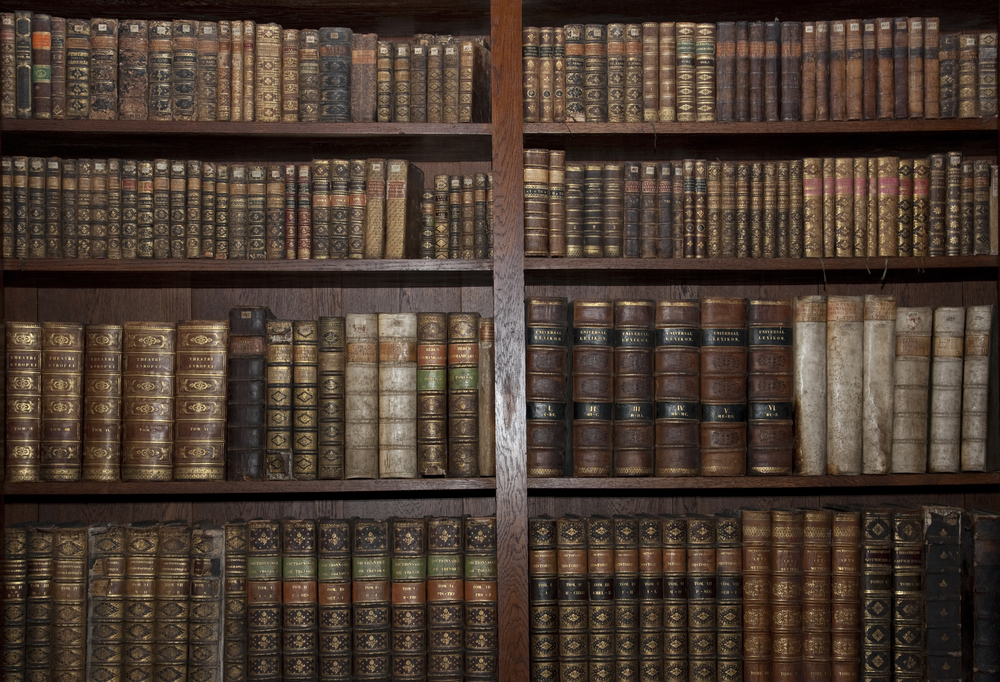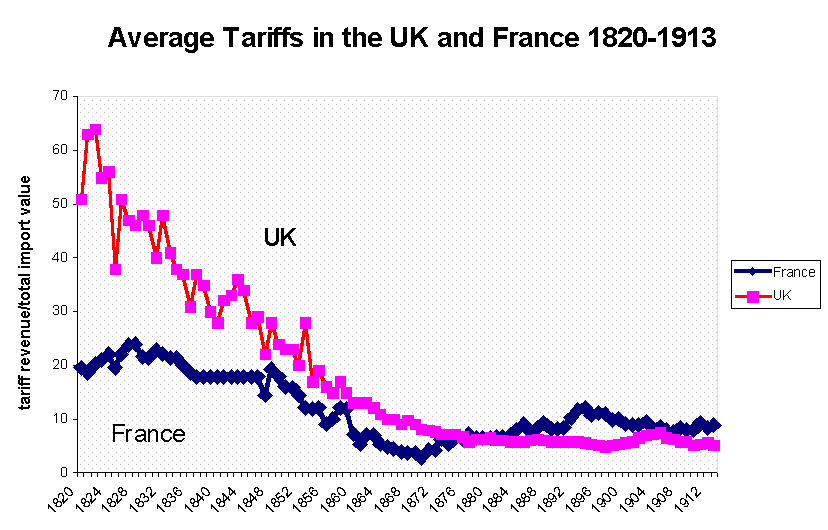The Myth of Free-Trade Britain
By John V.C. Nye

“Free trade should mean just that: free trade, with all goods admitted without duties, quotas, or restrictions. That was not British policy. They removed most tariffs but mostly on items in which they had a comparative advantage.”
Yet this story has one big flaw: it’s inconsistent with the facts.
As the story is usually told, British free trade came in the 1840s after a bitter political struggle to repeal the Corn Laws—a name given to a series of agricultural tariffs and quotas designed to keep farm prices high. This was quickly followed by rapid and dramatic reductions in duties on hundreds of imports. By the 1850s, all but a handful of commodities were admitted to Britain free of all duties. Sounds good, until you look closely at what products remained subject to high duties: those handful of items were the most contentious and some of the most highly taxed items that historically had been at the core of the mercantile debate in British history. In previous centuries they formed a large and significant fraction of British trade.
Free trade should mean just that: free trade, with all goods admitted without duties, quotas, or restrictions. That was not British policy. They removed most tariffs but mostly on items in which they had a comparative advantage. In other words, they mostly removed tariffs on items for which Britain had little to fear in terms of competition or which were of trivial importance in overall trade.
Britain in the early 1800s had just passed through the Industrial Revolution and was the world’s leading producer of cotton textiles and other industrial products. It took little courage to lower tariffs on British manufactures. It would be like Japan promoting free trade in the 1980s by arguing for lower tariffs on compact cars imported from America. Since Japan already made some of the world’s best and most economical small cars, such a policy would have had very limited economic impact. Japan’s lowering trade barriers in agriculture would have been substantially more important and would have run up against enormous political resistance.
For more on the Corn Laws, see Free Trade and Other Fundamental Doctrines of the Manchester School, Francis W. Hirst, ed., and “Laissez Faire in Nineteenth-Century Britain, Fact or Myth?” by Ellen Frankel Paul.
Nineteenth-century Britain had no comparative advantage in agricultural and foodstuffs. That is why the Corn Laws were initially so controversial. Consumers had a lot to gain from the state’s permitting the import of grain, because the British were not the cheapest producers of grain, while British farmers had much to lose. Unfortunately, the British did little to modify the tariffs on other contentious items, goods which had made for the commercial equivalent of war. Of these goods, the most important and the most troublesome was wine.
But how important is wine? To answer that we need to go back to the 1600s. Britain in the mid-seventeenth century was a prodigious importer of wine, mostly French. So much so, in fact, that her trade balance was in the red, mostly because of trade with France and mostly because of French wine, spirits and a number of luxury goods. Attempts to limit these imports by restricting trade had mostly failed. Tariffs were levied but never so high as to reduce the imports drastically. But then came the wars.
Two major conflicts spanning a quarter century kept French wine—indeed, all French imports—out of the British market from 1689 to 1713. The Nine Years’ War and the War of Spanish Succession led to hostilities between Britain and France and a complete breakdown in trade for this quarter century. During this grape-challenged period, three interest groups derived enormous benefit from the embargo on France—the British brewing industry, British distillers (gin, etc.) and British interests in foreign producers of alcohol—most notably the shippers of Portuguese wine. Prior to the late 1600s, the British drank plenty of wine, mostly French, a little Spanish, but virtually nothing from Portugal. The wars of 1689-1713 gave the Portuguese allies the opportunity of ten lifetimes. Beginning in 1703 a treaty was signed granting Portugal access to British markets for their wines—generally of a much lower quality than those of France, and often needing to be fortified with brandy or spirits in order to keep from going bad. The Methuen Treaty (as it was known) promised that Portuguese tariffs would always be at least a third lower than those of other nations, most especially France.
Of course, most of the Portuguese wine trade was dominated by British ships, merchants, and even vintners working in Iberia. The end of hostilities between Britain and France was seen as a grave threat to all these British interests, and vigorous lobbying by brewers, distillers, and the Anglo-Portuguese merchants stopped attempts to return to the period of open trade with the French. A bill to revive trade on prewar conditions between Britain and France was defeated in Parliament.
Even worse, tariffs were raised even higher throughout the eighteenth century. The result was that French exports of wine to Britain in the 1700s fell to less than 5% of the levels (measured by volume) that had prevailed in the 1600s. A twenty-fold decrease! The high taxes kept out all but the finest French products. Indeed, the French were kept out of the British market for most of the period of the Industrial Revolution, when the middle classes emerged and middle class tastes developed. Only the rich had access to the very finest clarets of Bordeaux. Cheap wine was simply not worth importing. And the British brewers, distillers, and merchant shippers never had it better. One historian has remarked that absent war and protection, the Gin Age1 might never have come into existence.
These assorted tariffs on wine and other consumables—which Adam Smith had condemned for their inefficiency in the eighteenth century—remained at the core of British protection in the nineteenth, when trade was supposedly made free. Though claiming to have moved to open markets, the British hung on to tariffs that were of long standing, and that moreover, prevented much progress from being made in bilateral treaty negotiations. France was not about to sign a bilateral commercial treaty if Britain was unwilling to compromise on wine and spirits.
Britain preached the gospel of free trade and France was cast in the role of the sinner, but there was little truth in this stereotype. France did have more protected products than England did but the average level of French tariffs (measured as total value of duties divided by total value of imports, cf. Figure 1) was actually lower than in Britain for three-quarters of the nineteenth century.2 In other words, tariffs had a smaller impact on French trade than British duties had on Britain’s trade. The French, while eschewing free trade, and openly rejecting the Anglo doctrine of open markets, actually succeeded in making their trade more liberal and more open than that of the more vocal British. The master of this was Napoleon III—Bonaparte’s nephew—who throughout the 1850s promoted the most radical liberalizing reforms of the French economy, all the while insisting that France was only interested in moderate reform.
Indeed, it was not British unilateral tariff reduction that moved the world to freer trade. Despite the belief that is still common today that British exhortation opened the doors to European free trade in the late 19th century, it was the 1860 Treaty of Commerce, promoted by the Napoleon III and concluded between Britain and France, that really ushered in the age of nineteenth century “globalization”. British demands for unilateral tariff reduction usually fell on deaf ears.
Doctrinaire free traders and economic theorists opposed the use of commercial treaties since they felt that unilateral reductions were the most efficient policies for all countries. While correct in the abstract, such claims did little to overcome political resistance to trade liberalization in most countries. On the other hand, unwillingness on the part of the British to lower wine tariffs killed early trade negotiations with both France and Spain. When the British finally decided to moderate their wine tariffs, Britain and France successfully concluded a treaty in 1860 which dramatically changed the landscape of European commerce. Politicians throughout Europe—who had till then resisted all pressure to liberalize trade—suddenly became fearful of being left out of a trade pact that united the two great European powers. The result was that the other major European powers quickly signed bilateral treaties with Britain and France as well.
Since these treaties were all Most Favored Nation treaties—whereby concessions to one party meant extending such concessions to all the others—not just France and Britain, but by 1870 nearly all of Europe including the German states, Spain, Russia, the Netherlands, Denmark, Sweden, and so on were integrated into a highly open trading market. In many ways, Europe was freer than today, partly because the gold standard made capital extremely mobile, and because limitations in border control made immigration and the free movement of labor easy in practice despite differing rules across the continent.
What politicians do and say are often quite different. That hasn’t changed. Indeed, though there is much talk about globalization and unfettered trade, there is no country in existence today whose policies come anywhere near the ideal of free trade. Goods and services do flow vigorously throughout the globe, but most countries suffer from a mix of import duties and non-tariff barriers such as quotas, unnecessary inspection rules and a bewildering variety of regulations that make it impossible for any of us to benefit fully from the specialization possible in a truly open world economy.
But more importantly, the example of Britain and France in the 1800s challenges us to rethink and reanalyze the relationship between trade policy and growth. The story of Britain and France shows how easy it is to be misled by the fables of conventional wisdom. The fact that Britain was not as free trade as it claimed doesn’t make the case for protectionism. The British did lower their tariffs, and in the last third of the nineteenth century, Britain did fully liberalize trade and benefited from the change. But the interesting and unexamined story is France. Nineteenth-century France doesn’t fit our preconceptions. France was in fact, closer to the free trade ideal than the British for much of the century, and did in fact do well, raising the standard of living of the average worker from the 1850s onward.
The Gin Age is often used to describe the early to middle years of the eighteenth century, when the consumption of hard liquor grew substantially, and the consumption of gin, especially among the poor, was seen to be a national problem.
Readers interested in a more technical discussion of the problem of tariff levels in the nineteenth century may consult Nye, 1991, “The Myth of Free Trade Britain and Fortress France,” Journal of Economic History and S. Dakhlia and J.V.C. Nye, “Tax Britannica: Nineteenth Century Tariffs and British National Income,” working paper available at http://papers.ssrn.com/sol3/papers.cfm?abstract_id=282114.

